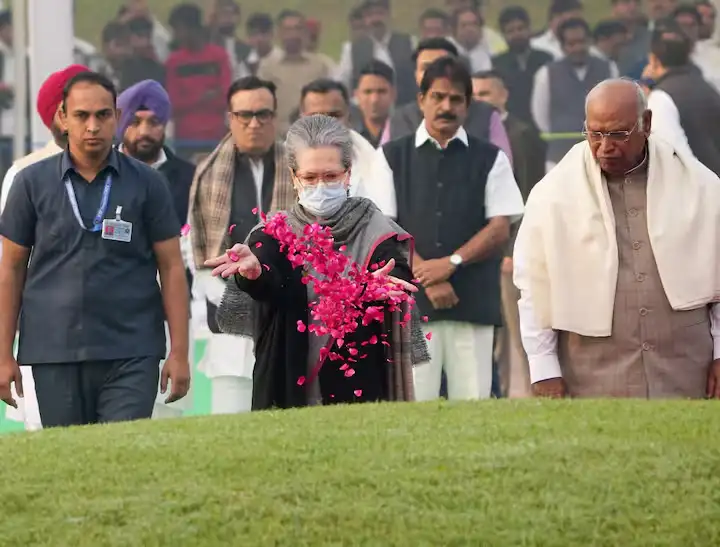Sonia Gandhi tribute Nehru on his death anniversary as Congress recalls the legacy of India’s first Prime Minister.
On May 27, 2025, senior Congress leader Sonia Gandhi paid floral tribute to India’s first Prime Minister, Pandit Jawaharlal Nehru, on his 61st death anniversary. The solemn occasion was observed at Shantivan in New Delhi, where Nehru was laid to rest. This day marked a moment of remembrance not just for the Congress party but for the nation, as leaders across the political spectrum recalled the legacy of the man who helped shape modern India.

Alongside Sonia Gandhi, Congress president Mallikarjun Kharge also paid his respects to Nehru. In his tribute, Kharge described Nehru as the “architect of modern India,” highlighting his contributions to building a democratic, secular, and scientific nation in the formative years after Independence. Several other senior Congress leaders and party workers joined the ceremony, reflecting the deep reverence the party holds for its towering founding figure.
Remembering Nehru’s Legacy
Jawaharlal Nehru, a central figure in India’s freedom struggle and the country’s first Prime Minister, passed away on May 27, 1964. His vision for India was rooted in values of democracy, secularism, and industrial progress. He laid the foundations of India’s parliamentary democracy and championed a model of planned economic development that emphasized education, science, and public sector growth.
His policies led to the establishment of key institutions like the Indian Institutes of Technology (IITs), the Indian Space Research Organisation (ISRO), and major public sector undertakings that played a crucial role in India’s early industrialization.
In her brief statement after offering flowers at the memorial, Sonia Gandhi said, “Nehru ji’s vision continues to guide us. At a time when democratic institutions are being tested, it is more important than ever to remember and uphold the values he stood for.”
Congress Party’s Enduring Bond with Nehru
For the Indian National Congress, Pandit Nehru represents not only the first leader of Independent India but also a symbol of the party’s commitment to liberal democratic ideals. Nehru served as the Prime Minister for 17 years, steering the newly independent country through the challenges of partition, economic hardship, and nation-building.
Mallikarjun Kharge, in a message shared on social media, emphasized Nehru’s commitment to inclusive growth. “Pandit Nehru envisioned an India where every citizen had access to opportunity and dignity. He believed in dialogue, pluralism, and the power of the Constitution. Today, as we face political and social challenges, we must reaffirm our dedication to his ideals,” Kharge wrote.
A Time for Reflection Amid Political Shifts
The anniversary comes at a time when Indian politics is experiencing significant shifts. With elections approaching and public discourse becoming increasingly polarized, Congress leaders have often invoked Nehru’s legacy as a counterpoint to the current political narrative, which they argue undermines the secular and democratic framework Nehru fought for.
By paying tribute on this day, the Congress party also aims to remind the nation of its foundational principles and historical contributions. The remembrance of Nehru, especially by leaders like Sonia Gandhi and Kharge, serves as both a moment of homage and a subtle reaffirmation of the party’s ideological stance.
Beyond Congress: Nehru’s Relevance Today
While the Congress party has always led tributes on Nehru’s death anniversary, the occasion has national significance. Nehru’s influence on India’s foreign policy, particularly his non-alignment strategy during the Cold War, and his efforts to build a secular and unified India, continue to be studied and debated.
Even critics of Nehru acknowledge his intellectual depth and political foresight. His role in drafting policies that promoted scientific thinking and social justice remains central to India’s progress in several fields. Despite the criticism that some of his economic policies attracted in later decades, Nehru’s commitment to building an egalitarian society laid the groundwork for much of what India has achieved since independence.
Emotional Connect for Sonia Gandhi
For Sonia Gandhi, Nehru’s memory carries a personal resonance as well. As the daughter-in-law of Indira Gandhi, Nehru’s only child, Sonia has often spoken about the influence Nehru’s writings and legacy had on her political understanding. She has frequently quoted from Nehru’s speeches and letters, especially in times of political crisis, to underline the importance of ethics in public life.
Sonia’s quiet yet firm tribute on Tuesday was a reflection of that emotional connection and her ongoing role as a custodian of the Nehru-Gandhi legacy within the Congress party.
A Day of Quiet Commemoration
The ceremony at Shantivan remained low-key but dignified. Floral tributes, silence, and reflection defined the morning. Congress workers and leaders stood in line to pay their respects, many holding placards with Nehru’s quotes on democracy and secularism.
Social media also saw a flood of tributes from Congress leaders, historians, and citizens, with hashtags like #RememberingNehru and #NehruJayanti trending throughout the day. Photographs of Nehru with Mahatma Gandhi, images from the freedom struggle, and clippings of his famous “Tryst with Destiny” speech were widely circulated as symbols of an era that laid the foundation of modern India.
Conclusion
The death anniversary of Jawaharlal Nehru is more than just a ritual for the Congress party—it is a moment to pause and reflect on the values that shaped India’s democracy. As Sonia Gandhi and Mallikarjun Kharge paid tribute at Shantivan, the gesture carried not only political significance but also an emotional and historical weight.
In an age of rapidly evolving political ideologies and divisive narratives, remembering Nehru is a call to uphold the principles of freedom, equality, and reasoned dialogue. Whether or not one agrees with all of his policies, his place in India’s journey remains unshakable. As long as the idea of a plural, democratic India lives on, so too will the legacy of Pandit Jawaharlal Nehru.






